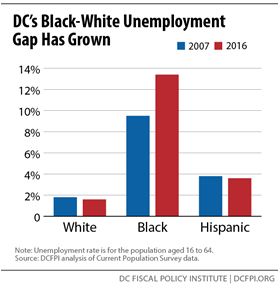CONTACT: Linnea Lassiter, Policy Analyst / 202-325-8853 / llassiter@dcfpi.org
The black-white unemployment gap in DC has grown increasingly wide since the Great Recession, according to new analysis by the DC Fiscal Policy Institute in Still Looking for Work: Unemployment in DC Highlights Racial Inequity. Despite the city’s economic growth and an overall drop in unemployment since 2010, recovery has been uneven, particularly across racial groups.
Black DC residents continue to experience elevated rates of joblessness and are the only racial/ethnic group whose unemployment rate is worse than it was in 2007; 13.4 percent of black workers in DC were without a job in 2016, compared with 9.5 percent in 2007. Meanwhile, white and Hispanic workers have bounced back from the recession, with just 1.6 percent of white residents and 3.6 percent of Hispanic adults were unemployed in 2016.
 Black residents are four times as likely as Hispanic residents to be unemployed, and eight times as likely as white residents
Black residents are four times as likely as Hispanic residents to be unemployed, and eight times as likely as white residents
- The black-white unemployment gap is far higher now than in 2007, when black residents were five times more likely to be unemployed than white workers.
This racial unemployment gap even affects residents with an advanced education. Black college graduates have a higher likelihood of being unemployed than other residents who also have a Bachelor’s degree or higher. Furthermore, unemployment has not fully recovered from the recession for black college graduates, while it has for other college graduates.
- The unemployment rate among black college graduates was 5.7 percent in 2016. Although this is substantially lower than the overall unemployment rate for black workers, it is three times higher than the 1.9 percent rate for non-black college graduates.
- While non-black college graduates now have a slightly lower unemployment rate in 2016 as before the recession, black college graduates are still more likely to be unemployed today than before the recession, when their unemployment rate was 4.2 percent.
“These findings underscore the fact that DC’s economic growth has left many black people and those without a college degree behind,” said Linnea Lassiter, policy analyst at the DC Fiscal Policy Institute. “DC should invest in more job training and adult education programs to ensure that all residents benefit from our city’s growing job market.”
Although the black-white unemployment gap is often attributed primarily to disparities in education, this indicates that other factors, such as systemic racism and employment discrimination also contribute to high unemployment among black residents.
JPEGs of the graphics in the report are available upon request.
